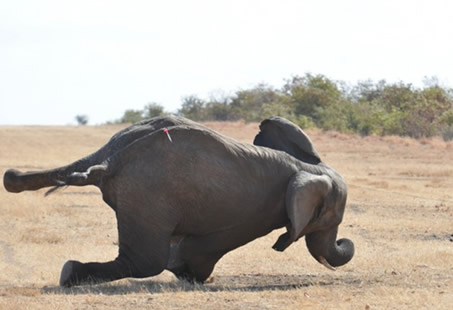|
|
Erruesh olenkaina enaimurruai. (Maasai) Ndovu anaweza angushwa na mumea anayetambaa. (Swahili). L’éléphant peut être déclenché par plante rampante. (French) The elephant can be tripped by a creeping plant. (English) |
Maasai (Kenya, Tanzania) Proverb
Background, Explanation, History, Meaning and Everyday Use
 In the Maasai worldview in East Africa as in many other African traditional folklore milieus, the symbolism of an elephant is a demonstration of sheer strength, might and brawn. As such, Maasai folklore (stories and proverbs) compares the might of the elephant with the simplicity and humility of the hare, a small creature compared to the elephant or in the case of this proverb, a creeping plant. The stronger character (the elephant) is thus often presented as being the more gullible to the trickery and brain power of the smaller and weaker creatures or character.
In the Maasai worldview in East Africa as in many other African traditional folklore milieus, the symbolism of an elephant is a demonstration of sheer strength, might and brawn. As such, Maasai folklore (stories and proverbs) compares the might of the elephant with the simplicity and humility of the hare, a small creature compared to the elephant or in the case of this proverb, a creeping plant. The stronger character (the elephant) is thus often presented as being the more gullible to the trickery and brain power of the smaller and weaker creatures or character.
Such juxtaposition of contrasting attributes serves to give warning to people in diverse contexts. For instance, it warns against the use of brawn but instead uses the brain or to have humility instead of pride. This proverb is thus very useful in everyday living where those who are in positions of power and influence ought to use their power and influence well and not to intimidate and lord over the weak and poor.
More importantly, the proverb suggests that people should not brag about their accomplishments and also not to show that they are invincible. This is because, like another English saying warns, pride comes before a fall. That the sense of self importance and chest-thumping that people display with their perceived strengthen when compared to others is mostly likely to be followed by utter shame. The Maasai proverb thus advises that one should not feel over confident when doing well, as one can be brought down by something seemingly small and insignificant.
Biblical Parallels
The Bible has many scripture passages that capture the spirit and teaching of this proverb as the following examples show:
Proverbs 16:18 points out that, “
Pride goes before destruction, and a haughty spirit before stumbling.
Proverbs 29:23 goes further to say, "A man’s pride shall bring him low."
Romans 11:20-21 highlights a similar issues noting that, “Do not be conceited, but fear; for if God did not spare the natural branches, He will not spare you, either.”
1 Corinthians 10:12 finally warns that ,”
Therefore let him who thinks he stands take heed that he does not fall.”
Contemporary Use and Religious Application
The Maasai proverb and the biblical parallels above underline the importance of meekness and being lowly in character especially for leaders. In the present times the proverb can therefore be used to urge people in positions of authority and influence, be they political, religious, or community leaders not to be overconfident and proud but instead be meek and humble. That meekness is not a demonstration of weakness but an opportunity to bridge or narrow social or power distances that often inhibit service provision to people. This is the kind of leadership and spiritual qualities demonstrated by two of the Bible’s greatest personalities, Moses and Jesus as captured in the following scriptures. Numbers 12:3 says that Moses was very meek, above all people on face of the earth, and Matthew 11:29, 30 captures Jesus as saying, "I am meek and lowly in heart." Note that Moses and Jesus despite their meekness provided excellent leadership in their mission here on earth. The same qualities they showed should also be demonstrated by all leaders at every level in the interest of offering servant and quality leadership today.
Note: This proverb is No. 20 in the booklet [105] Maasai Proverbs Collected from Social Media Forums. Some of these forums are Facebook and Twitter.
Joseph Kariuki
P.O. Box 10097-00200
Nairobi, Kenya
Email: jkariukim03@yahoo.co.uk
Photographs selected by:
Cephas Yao Agbemenu
Department of Art and Design
Kenyatta University
P.O. Box 43844
Nairobi, Kenya
Cellphone: 254-723-307992
Email: cyagbemenu@yahoo.com


